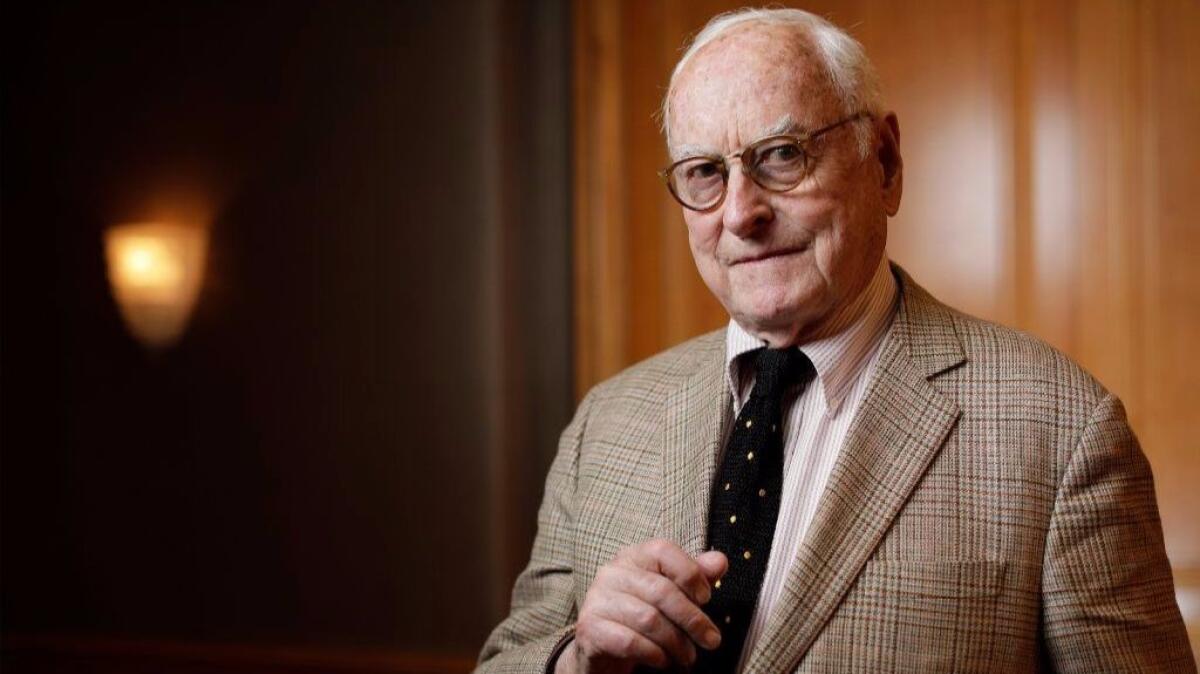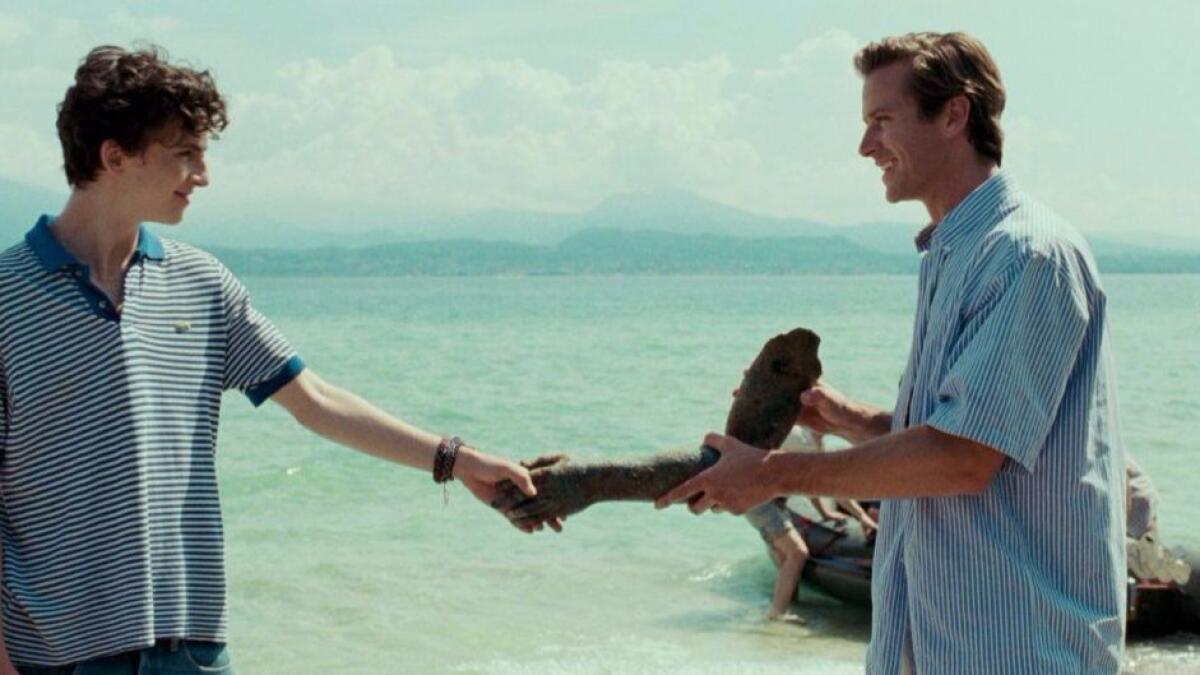Q&A: James Ivory is a three-time Oscar nominee. ‘Call Me by Your Name’ might bring his fourth

James Ivory has never won an Oscar.
That seems insane considering that he is something of a legend in Hollywood. With a career spanning more than six decades, he has done more than direct, and sometimes write, great films; he helped shape American cinema. From the mid-’80s until the mid-’90s, the films of Merchant Ivory Productions, which he led with his late life partner, Ismail Merchant, and their late longtime writing collaborator Ruth Prawer Jhabvala, were such a dominant force at the box office and during awards season that “Merchant Ivory” became a genre unto itself.
Ivory directed almost all of them, and although “A Room With a View,” “Maurice,” “Howards End” and “Remains of the Day,” among others, nabbed countless Oscar nominations (including three for Ivory) and at least six wins, Ivory has yet to take home a golden statue for his contributions.
That could change next year. Ivory, as screenwriter of the gay love story “Call Me by Your Name,” is the leading contender for best adapted screenplay at the Oscars.
“It’s nice, sure,” the 89-year-old says with a smile about being back in the awards season conversation for the industry’s most coveted prizes. “I’m not complaining.”
“Call Me by Your Name,” adapted from André Aciman’s 2007 novel of the same name, stars breakout Timothée Chalamet as a teen named Elio who falls in love with Oliver (Armie Hammer), a graduate student staying at his family’s home for the summer. Since the picture’s Sundance Film Festival debut earlier this year, it’s become a critics’ darling. Audiences seem equally enamored; the film has pulled in a formidable $908,175 from just four screens since its limited release two weeks ago.
In anticipation of the Golden Globes nominations, which will be announced on Monday, The Times spoke with Ivory about his 60 years making films, what prompted him to pick up the screenwriting pen once more since his last project in 2003 and comparisons between “Call Me by Your Name” and his seminal work “Maurice.”

How did you get involved with “Call Me by Your Name”?
The people who optioned the book rights are neighbors of mine. I believe they gave me the book to read. I liked it and they asked me to be an executive producer on it because they thought they needed some sort of name of experience [attached to the project to get it financed].
There was an existing script that someone else had written, but they couldn’t locate someone to do it. Eventually they found [director] Luca [Guadagnino] through Tilda Swinton, I think, who had just done “A Bigger Splash” with him. He said yes but wanted me to co-direct. I said yes, but I wanted to write my own screenplay.
It was a two-year process, a year of actual writing. [Once they got the film funded,] they thought [having co-directors] could slow the shooting process, which they were right, it could.
The last film you wrote was “The Divorce” in 2003. What about “Call Me by Your Name” made you want to write the film?
One thing about it is the story was set in Italy. I love Italy and go there all the time. The idea of working in Italy was very attractive to me, and I liked the story. I had done another film a bit like that, which was “Maurice,” which I had also written.
In adapting the book, what liberties did you take with the story?
I pretty much wanted to follow the story, but up to a point. There were two things I didn't want to do. The entire [third part] has to do with a trip the two boys take to Rome before Oliver is about to leave to go back to America. They go to a big book party and meet people and have a wonderful last fling. That took up like a fourth of the book. I thought, well, we can’t really have a sequence like this coming at the end of a film; no one's going to sit through all of that. So, the boys need to take a trip and go off together but not to this whole thing.
In the book, it's told from the point of view of a young man now age 40 looking back and remembering the whole thing. He’s telling his story in a narrative. At the end of it, they meet up again in Italy and Elio thinks that they could get back together, but they can’t. I didn’t think that was a way to end the film. I thought it would be a downer to do that.
I knew we had come to a place where you could make a film about same-sex romance and nobody's going to charge you with obscenity.
— James Ivory
While most people love the film, some have highlighted a “coyness” around the depictions of intimacy between the two main characters. This is in slight contrast to a number of your films where male nudity, for example, is kind of matter-of-fact.
With “A Room With a View,” in the book and film, three young Englishmen go to have a swim in the pond. They take off all their clothes and jump in the water -- one of them is a reverend. They’re splashing in the water and wrestling and whooping like Englishmen like to do and who should come down the path but two proper English ladies and they are ambushed by these three nudes. It’s a comical scene… it had to be like that and I wasn’t going to change that. My attitude about that was whatever is seen is seen and what is not seen is not seen, so let’s shoot.
I’m sure [Chalamet and Hammer] have it in their contracts that they didn’t have to [do fully nude scenes]. That’s common in this country; so many American actors don’t like to get undressed in front of the camera. In Europe and in England they like to. I guess we're just so puritanical here or something.
Was there any frontal nudity written into the script?
Well, it was all implied. They get undressed before they have their first night together. But there’s plenty of nudity in that scene as it exists. I don’t know what all the fuss has been about. [What’s there] was a result of their contract and I don’t think it meant that much to the movie or Luca.
“Moonlight” also faced a similar critique for how it captured, or didn’t, the film’s most physically intimate scene.
Well, tell them to read the contracts. [Laughs]

You’re known for the 1987 film “Maurice,” which is credited with redefining queer cinema because it had a happy ending. How would you evaluate the changes over time regarding LGBTQ representation?
There are plenty of stories in that period from different countries about love between two women or two men. Generally, we're more relaxed about that now than people were even in the ’80s. Earlier, of course, they weren't relaxed at all. But just about anything goes now.
We’ve had gay characters in many of our [Merchant Ivory] films. We made a short film with James Mason in which he plays a gay man some time ago. It’s one of our best films, only an hour long. It’s an Indian film called “Autobiography of a Princess.” When we tried to sell it to the BBC, the guy who was buying it said he refused to show it [and that] he personally felt so sorry for James Mason being in such a film. That was 1976. It was turned down for immorality and expressions of distaste. Ten years later, we're making “Maurice” and there [wasn’t] a peep out of anyone. Everyone liked it and I knew we had come to a place where you could make a film about same-sex romance and nobody's going to charge you with obscenity, even if it had a happy ending.
Why do you think “Call Me by Your Name” is doing so well with audiences and critics alike?
I think every adult who sees the film or reads the book has gone through the splendors and terrors of first love, what that brings with it, the good and the bad. Everybody can identify with that. For some people, looking back it's a marvelous experience. For others, it's a terrifying one.
Are you looking forward to what may come from “Call Me by Your Name” receiving so much attention?
I don’t know what may come. What I can imagine happening is … well, the film is a box office success, so that is good in general terms of wanting to do things. But I can imagine that other people will want to do another gay story and they will come to me because I did this.
But my plan is to try to make a film from Shakespeare's play “Richard II.” I've been working on that for years and I think it may happen. I’m also interested in doing another English film.
Only good movies
Get the Indie Focus newsletter, Mark Olsen's weekly guide to the world of cinema.
You may occasionally receive promotional content from the Los Angeles Times.








